Top 10 Network Management Tools in 2024: A Guide to IP Scanners.
There are numerous devices that can be connected to a computer network.
It is crucial to identify the information and IP addresses of these active devices for security purposes. As an IT administrator, utilizing top-notch IP scanner tools allows you to detect vulnerabilities, address them, and safeguard your system and network. While network and IP scanning can be performed manually, the availability of port scanner tools offers an automated process that provides precise and up-to-date results.
In this tutorial, we will explore 10 free and paid tools that can assist you in efficiently managing your network and tracking IP addresses to ensure the protection of your sensitive data.
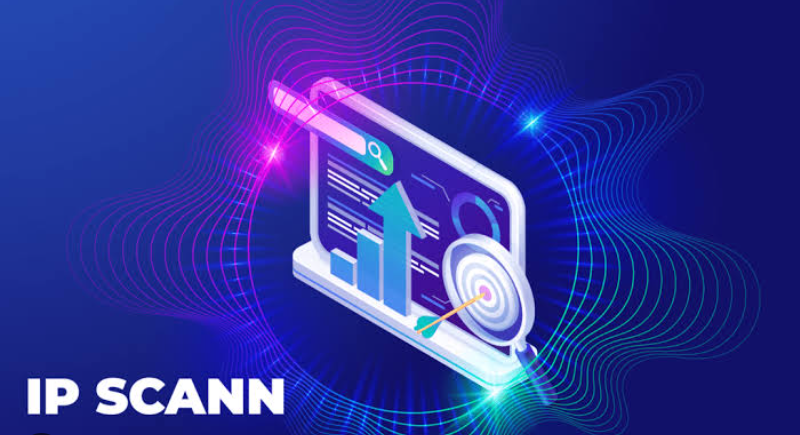
Explore More; Effortless PHP Installation on Windows in Three Easy
Conducting vulnerability identification and penetration testing, crucial for uncovering system flaws and potential security threats, forms integral parts of a network security assessment. Even seasoned networking professionals are strongly advised to employ a suitable IP scanning tool to observe open ports and network infrastructure, preparing for unexpected threats.
Explore and review the pros and cons of the most used and professional IP and port scanners in 2024.
What is Network Scanning and Why is Important?
For any security-conscious network administrator, network scanning stands as a crucial activity, providing substantial assistance in identifying and analyzing network vulnerabilities.
By scanning the entire network, a network manager gains awareness of detailed information about all connected devices, ports, traffic, active hosts, and more.
A reliable IP scanner simplifies and streamlines IP address allocation, management, and filtering for network administrators overseeing sizable networks of PCs and other devices, where tracking numerous IP addresses is a common task.
You can verify that a firewall is properly set and that it prevents superfluous services from being visible or exposed on the public Internet by scanning for open ports. Therefore, network administrators and security experts alike must use the best IP port scanner tools to assess Windows and Linux target computers.
Network scanning is divided into 3 types:
- IP scanning.
- Port scanning.
- Vulnerability scanning.
Top 10 Network Management Tools in 2024 [Free & Paid]
Network administrators, concerned about security, find network scanning a vital activity as it significantly aids in identifying and analyzing vulnerabilities.
Scanning the entire network allows managers to gather detailed information on connected devices, ports, traffic, active hosts, and more.
Trusted IP scanners simplify the allocation, management, and filtering of IP addresses for administrators overseeing large networks of PCs and devices, where tracking numerous IP addresses is a common task.
1. SolarWinds [Free Trial-Windows OS]
SolarWinds Network Scanner is one of the best IP scanner tools for identifying device vulnerabilities. Providing a user-friendly interface, the SolarWinds IP address manager allows users to customize charts and dashboards. SolarWinds is easy to use and makes it easy to access the Open Port Scanner.
Every device inside a specified IP address range will be scanned by the Open Port Scanner. To obtain an exhaustive system sweep, one might simply input an extremely broad range. This utility not only scans the network but also serves as a network discovery tool by registering every IP address in use and then scanning the ports of any devices it finds. It provides an abundance of other network administration functions as well, allowing admins to see your network more comprehensively.
Included in the SolarWinds Engineer’s Toolset, this system is one of the more than 60 essential system administration tools.
This product is intended for large and intricate organizations, rather than for personal use.
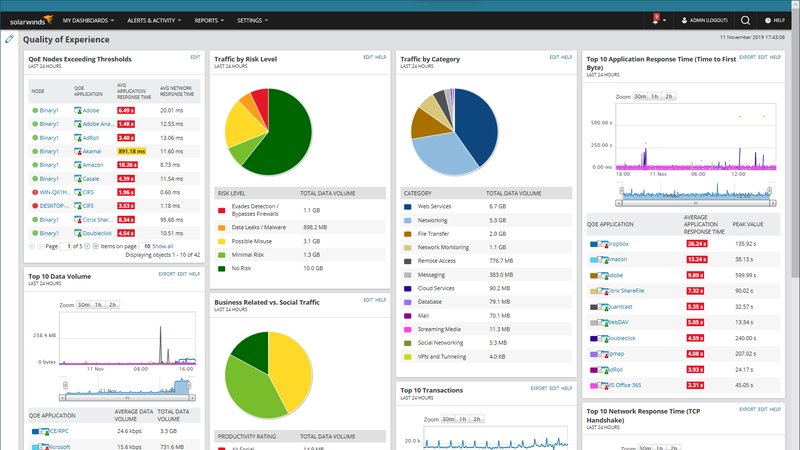
SolarWinds Advantages
- Free. (Registration Required)
- Once discovers a device, starts scanning.
- Scan ability with a command line.
- Save scan configuration.
- Easy to use and read layout.
- IPv4 and IPv6 address management.
- Remote Server Monitoring.
- File Monitoring.
- Windows Server & Microsoft IIS Monitoring.
- Scan any available IP addresses alongside their TCP and UDP ports.
- Displays the IANA port name.
- Network topology map.
- Alerts & Reports.
SolarWinds Disadvantages
- Not free forever; only available for a 14-day trial.
- It could be difficult for non-technical users to use the program.
2. Angry IP Scanner [Free-Windows-Linux-Mac OSX]
Angry IP Scanner stands out as a free and open-source IP scanning tool, requiring no installation due to its portable nature. It is incredibly lightweight and user-friendly.
With this tool, users can effortlessly scan ports and IP addresses within both private and public ranges. The program comes equipped with default features like Ping, Host-name, and Ports. Additionally, users have the flexibility to enhance functionality by adding other fetchers through plug-ins.
Designed for small networks and home use, Angry IP Scanner proves to be an excellent tool for network administrators, IT specialists, or anyone dealing with compact networks.
Its versatility becomes particularly valuable in environments where multiple operating systems are used concurrently.
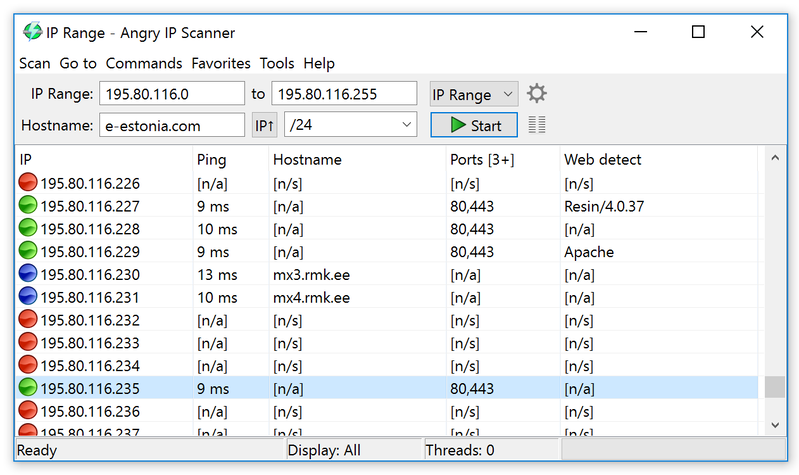
Angry IP Scanner Advantages
- Free and open-source.
- Fast and light.
- Easy to use.
- Provides GUI and CLI options.
- Works on all major platforms.
- Provides DNS and hostname metrics.
- Resolve hostnames and find the MAC address.
- Export the results in different formats such as TXT, CSV, and XML.
Angry IP Scanner Disadvantages
- The interface doesn’t scale well on enterprise-size networks.
- Lacks graphing capabilities.
3. Nmap [Free-Windows- Linux OS]
An open-source and robust port scanner tool, Network Mapper (Nmap) empowers users to craft packets, send them to a specific target, and await the program’s response.
Nmap is highly recommended for network scanning due to its speed, flexibility, and numerous features, including device detection, port scanning, and security flaw checks.
Nmap proves to be an invaluable tool, trusted by network and system administrators, security experts, ethical hackers, cybersecurity professionals, and IT specialists alike. Its reliability extends to those in need of comprehensive details on open ports, services, and OS versions.
Thanks to its adaptability, NMAP excels in various tasks, including IP filters, firewall evasion, diverse scanning methods, results presentation in different formats, customization options, and the identification of operating systems and service versions running on hosts.
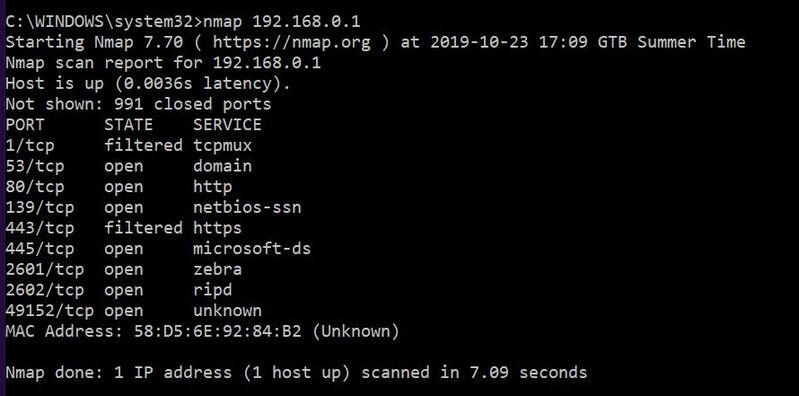
Nmap Advantages
- Free and open-source.
- Discover open ports.
- Deep analysis.
- OS and services detection.
- TCP and UDP port scanning.
- Provides version and information of the hostname.
- Scan single/range ports.
- Perform NSE scripts.
- Designed for business purposes.
Nmap Disadvantages
- Not beginner-friendly.
- Not designed for simple troubleshooting.
4. Advanced IP Scanner [Free-Windows OS]
The Advanced IP Scanner is a free, lightweight, and user-friendly Windows network scanner. Installation is not required for the Advanced IP Scanner. You can access one of the most powerful scanners by simply pressing the play button. Advanced IP Scanner provides a report with responses from each device as soon as the scan is finished. The list of network devices that includes details like IP, Port, Manufacturer, MAC Address, OS, etc. may be viewed with Advanced IP Scanner. You can turn on and off your computer, view shared folders, and remotely control several machines using the Advanced IP Scanner.
Advanced IP Scanner provides two methods, Radmin and Remote Desktop Control (RDP), enabling remote control of devices, including the capability to power them on and off.
Making it an excellent choice for remote control through Remote Desktop Protocol and Radmin, Advanced IP Scanner stands out. Another distinguishing feature is its swift access to shared resources through FTP, HTTPS, HTTP, or shared folders, coupled with the rapid identification of every device in a specified scan within seconds.
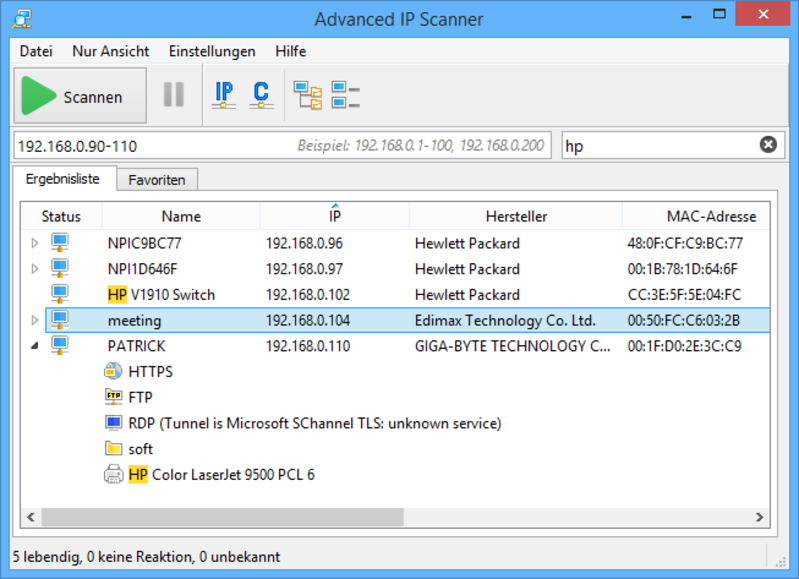
Advanced IP Scanner Advantages
- Free.
- Easy to use.
- Simple interface.
- Reliable and Portable.
- Quick scan.
- Easy access to shared resources.
- Detect the RDPs or Radmin ports.
- Exports scan results to a CSV file.
Advanced IP Scanner Disadvantages
- Not designed for enterprise networks.
- Lacks multiple export formats.
- Does not support graphing to see how devices or traffic are moving.
5. Free IP Scanner [Free-Windows OS]
Eusing Software offers a variety of free tools for Windows users, and among them is the widely utilized Free IP Scanner. Operating at a speed of 100 devices per second, this portable, stand-alone scanner proves to be an excellent choice for those seeking a quick and straightforward method to scan their network for IP addresses.
Additionally, it boasts a wide range of helpful features, including port scanning and hostname resolution.
Eusing Free IP Scanner proves highly beneficial for anyone, regardless of technical expertise, needing to monitor their network.
System administrators appreciate its swift scanning capabilities for large networks, while regular users find its user-friendly interface particularly helpful. Individuals with low system resources can especially benefit from Eusing Free IP Scanner.
Free IP Scanner Advantages
- Free to use.
- Free IP Scanner pings.
- Quick scan.
- Stable.
- User-friendly interface.
- Find closed and open ports.
- Provide NetBIOS information.
- Store information in a text log file output.
- Scan multiple targets per second.
IP Scanner Disadvantages
- Supports Windows OS only.
- Designed for large enterprise networks.
6. Netcat [Free-Windows-Linux-Unix OS]
Designed as a feature-rich networking tool, Netcat stands out among IP scanner tools.
It utilizes the TCP/IP protocol to read and write data across network connections. This powerful tool is intended to serve as a dependable ‘back-end’ tool, providing simplicity for standalone use or easy control by other applications and scripts.
Additionally, Netcat offers numerous built-in features and can establish nearly any type of connection, making it a versatile and feature-rich tool for network troubleshooting and research.
The ability of Netcat to establish any type of network connection, including TCP and UDP, to or from any port is one of its distinguishing characteristics. In addition, it contains built-in support for source routing, port scanning, DNS forwarding and reverse checking, and more.
It is still among the greatest tools for network debugging and investigation, even though it has been around for a long and may appear outdated.
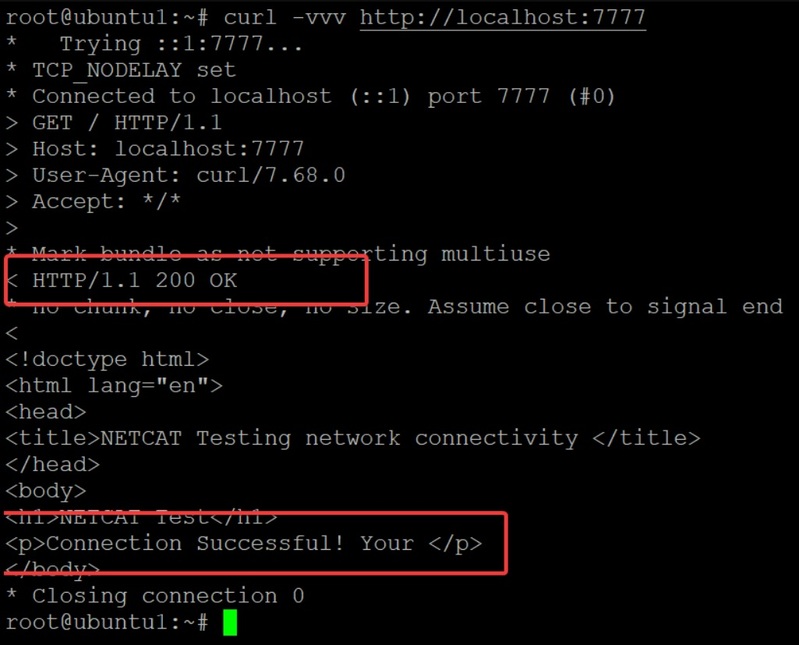
Netcat Advantages
- Free to use.
- Secure and easy to use.
- Beginners friendly.
- Advanced networking capabilities.
- A remote system can be accessed via any port or service.
- Scan, listen, and forward open ports.
- Tunneling ability with source port/interface, listening port/interface, and the remote host.
- Debug scripts and grab service banners.
- Support file transfer between host and client.
Netcat Disadvantages
- Complicated scanning tool.
7. Intruder [Free Trial-Windows-Linux]
Intruder Network Vulnerability Scanner, a cloud-based SaaS product, offers three levels of vulnerability scanning services. The basic service conducts a monthly scan of secured systems to check for vulnerabilities.
Trusted by over 1,500 businesses worldwide, Intruder’s potent Network Vulnerability Scanner stands out. While it can identify more than 10,000 vulnerabilities, its primary advantage lies in reducing the size of your external attack surface.
Beyond performing extensive and ongoing network checks for vulnerabilities, it prioritizes exposures on systems visible to the internet, allowing you to address the most serious threats promptly.
The vulnerabilities that Intruder may discover in your systems are too numerous to list; they could include configuration problems, patch gaps, application bugs, encryption flaws, and more. Nevertheless, because of its smooth integration with Jira, Zapier, Microsoft Teams, and Slack, you can make sure your developers have the information they need to address these problems as soon as possible.
It also works with your CI/CD pipeline and detects potential threats using its API.
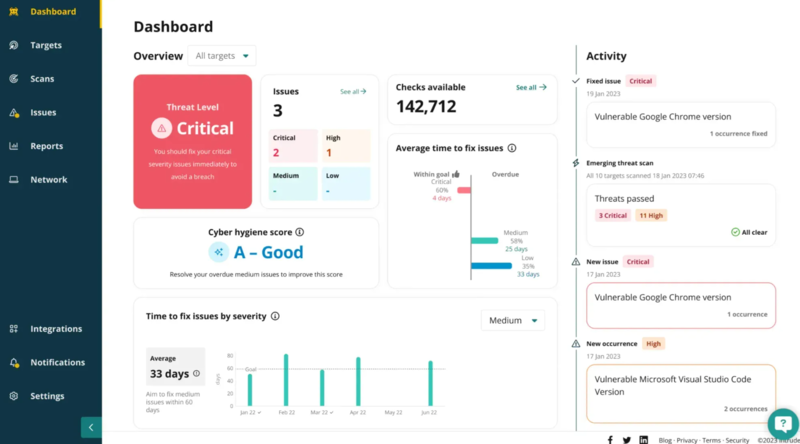
Intruder Advantages
- Scan for over 10,000 vulnerabilities.
- Detect weak configurations and application problems.
- Great GUI.
- Automated vulnerability scan scheduling.
- Scan all new devices for vulnerabilities.
Intruder Disadvantages
- Complicated scanning tool.
8. OpenVAS [Free-Linux OS]
OpenVAS is a free and open-source vulnerability scanner for Linux that has over 50,000 vulnerability tests with both authenticated and unauthenticated testing. This is a penetration testing tool rather than an automated system, despite the word “VAS” standing for “vulnerability assessment scanner.” You can conduct vulnerability scans using the web interface that comes with the platform instead of being restricted to using desktop software. You can configure many scan levels using this system, and each step can take a while to complete. Letting the system go through all of its testing is not common.
You can use OpenVAS’s Task Wizard to walk you through the process of network scanning. After completing a quick scan and entering the machine’s IP address, you may examine the results along with a summary and visualizations. The Advanced Task Wizard allows you to create more sophisticated scan choices. You may schedule future scans, assign a task name, configure the scan, and more with the advanced wizard.
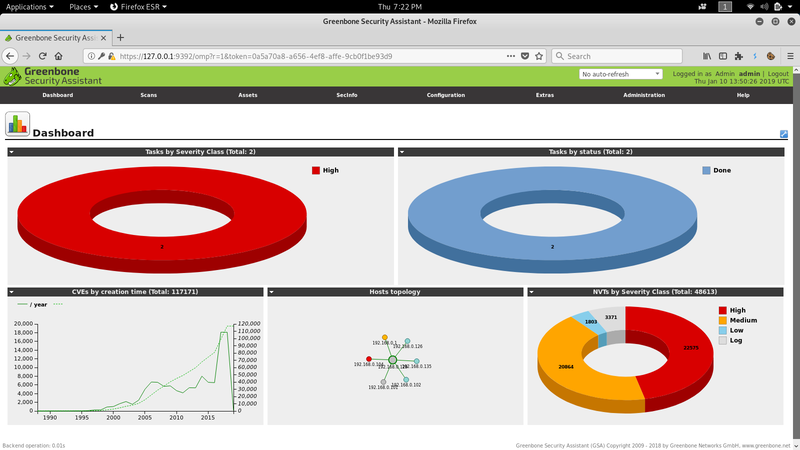
OpenVAS Advantages
- Free and open-source.
- Large community.
- Affordable vulnerability scanning and penetration tool.
OpenVAS Disadvantages
- No paid support option.
- Complex tool.
9. Komodo Slitheris [Free-Windows OS]
Komodo Slitheris Scanner is a fast and accurate Windows-based premium IP scanner. Network admins, security professionals, and penetration testers can search for up to 50 network devices with this powerful network scanner’s free edition, but more features are available with the premium license. Using this tool, you can detect a wide range of devices. With the use of sophisticated methods like ARP pings and heuristic analysis, it can even locate hidden devices. It also contains many other useful features, such as real case-sensitive PC name detection and experimental network device type detection.
With its speed and ability to locate information that other scanners miss, this tool elevates IP scanning to a new level. It collects data from target network devices without the need for agents or credentials. Slitheris Network Discovery employs ARP pings to locate hidden devices and multi-threaded technologies to swiftly locate all pingable devices.
Without requiring the user to install an agent or log in to the remote computer, the program uses TCP/IP fingerprinting to determine the kind of operating system on remote hosts. But bear in mind that while Komodo’s device database may be larger than NMAP’s, the aforementioned functionality is also accessible on NMAP.
Komodo Slitheris Advantages
- Free to use.
- Ideal for small home offices to big enterprises.
- Outstanding GUI.
- A great option for small MSPs.
- Detect machines with issues.
Komodo Slitheris Disadvantages
- A paid version is required for up to 50 network devices.
10. MyLanViewer [Free-Windows OS]
MyLanViewer stands out as one of the best IP scanner tools, offering basic functionality that involves scanning the target network and presenting a user-friendly list of IP addresses, MAC addresses, NIC vendor, OS Version, logged users, and shared folders for all identified wired and wireless devices. Despite its seemingly outdated appearance, this software remains compatible with nearly every version of Windows, including Windows 10 (32 and 64 bits), 7, 8, XP, Vista, and more.
A robust Windows network scanner, MyLanViewer is known for its simplicity and user-friendly interface. It provides abundant details, including shared files, MAC and IP addresses, Whois information, and more. Additionally, it offers useful features like external IP address monitoring, remote computer control, and tracerouting. IT specialists or network administrators overseeing Windows servers and requiring local area network (LAN) monitoring are recommended to utilize MyLanViewer. It is particularly well-suited for use in small- to medium-sized enterprises.
MyLanViewer Advantages
- Free to use.
- Monitor all the scanned devices including hidden ones.
- Ideal for small networks and home use.
- Detect rogue DHCP servers.
- NetBIOS scanner.
- Provide Whois and Traceroute tool.
MyLanViewer Disadvantages
- Large networks find the interface cluttered.
- Nested menus.
For more updates follow us on Meta ,X,Instagram .


